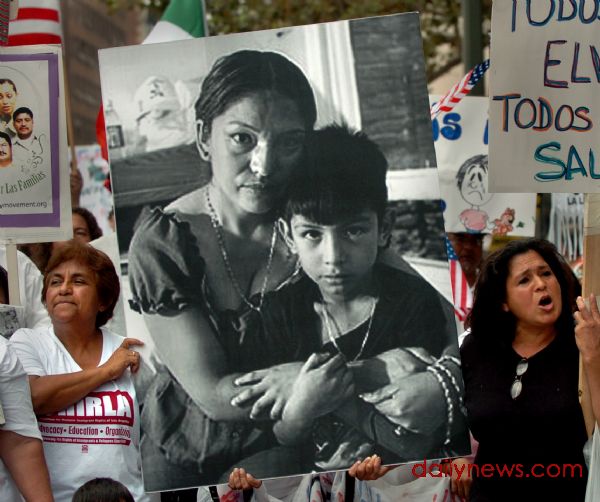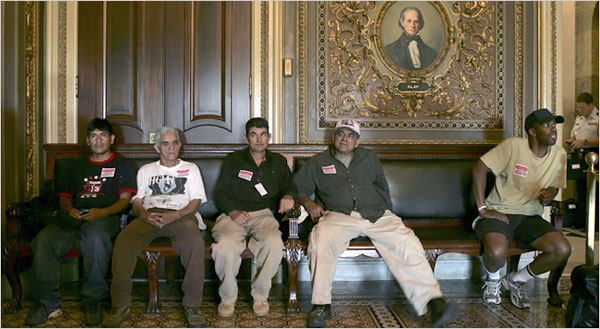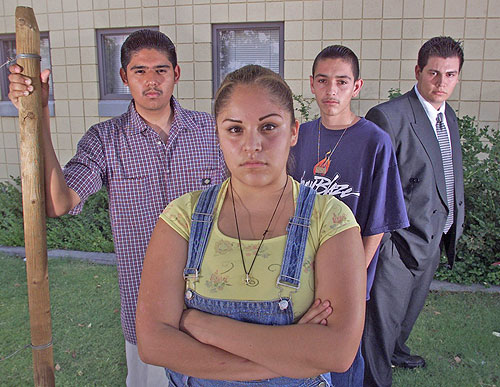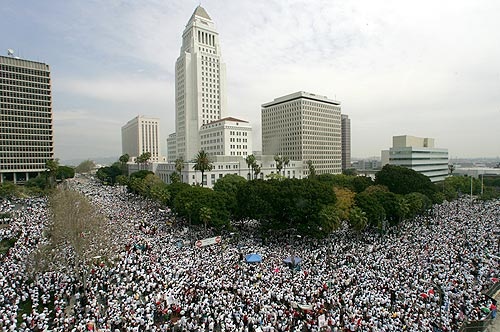|
SOC 335 Fall 2007     
      |
|
SOC 335 Fall 2007     
      |
TEXTBOOKS
This course explores the historical sociology of Latino peoples in the United States at three levels: First, we survey the history of annexation, dispossession, migration, and ethnic resistance and adaptations of Mexicans in the United States, from their 19th-century conquest and incorporation into the U.S. Southwest, through their racialized/"alien-ized", mostly working class, migratory and settlement experiences during the first six decades of the 20th century; to their ethnic rebellion and cultural resurgence in the late 1960s and early 1970s - the Chicano Movement -, to their present day contradictory dual evolution as a domestic, "American entitled," leading and increasingly successful component of the emerged Latino panethnicity, yet ceaselessly being replenished by a massively stigmatized & persecuted, "illegal" immigrant component, the product of extensive and asymmetrical US-Mexico economic integration.
Secondly, we explore various
Caribbean/Central American Latino
communities in the U.S. since the 1960s, with an emphasis on their
historic and contemporary modes of annexation/integration into the U.S.
political economy, society, & culture.
Lastly, we look at the role and contributions Latinas have been playing in every aspect of the Latino experiences in the United States since the XIX Century. We will do this by exploring the lives of 15 prominent Latinas.
Grupo structure
of student
participation: The
course will rely on intense student class participation,
accomplished
through group ("grupo")
presentations, class discussions, and joint research projects. The
students
will therefore form 10 grupos
of
up to four students each at
the beginning of the course and engage in collaborative &
participatory learning throughout the quarter.
Attendance: Attendance is mandatory. Unauthorized absences, tardiness, and/or early departures will be penalized (especially for those that miss or are late to their own scheduled presentations!). If you need to be excused (or need to leave early/arrive late), please call or talk to Dr. Santos ahead of time.
Lectures, grupo
presentations, and class participation: Dr.
Santos
will typically lecture (all by himself during the reading of the first
book, or after the grupo student
presentations subsequently). Occasionally, there
may be a video documentary shown after the student presentations as
well.
All students -
including those not
presenting - are expected
to come to class fully prepared
to discuss the assigned readings for each
class session.
The policy
on class
participation is, on the one hand, "no
investigation,
no
right to speak - at least not at first." Informed & frequent
student participation,
on
the other hand, is
highly encouraged and will be rewarded by
Dr. Santos
at the time of giving final grades.
Each grupo will be assigned two class presentations
during
the term (see rotational schedule below). Each time, the
presenting students will take turns
summarizing and critically assessing the various significant issues or
aspects contained in the
assigned reading for that day. Each presenting student will be
given the
opportunity to make a presentation for roughly 5 to 7 minutes. Each
presentation should be delivered as a PowerPoint presentation
(print it for Dr. Santos; please do not CLUTTER slides with too much
text - make more slides when needed!). Students are
responsible for uploading and pre-testing
the files earlier, before
class starts! All
individual presentations should end with at least one
well-thought-out question for
discussion. Following
the individual presentations,
there will be full class
discussion focused on the questions raised.
The individual presentations will be
graded based on organization &
clarity, relevancy of topics selected, accuracy, quality of critical
analysis & final question, and overall presentation skills.
The grupo
presentations
will also be assessed a grade based on the quality of the overall organization of
the themes or aspects covered, including the final questions, and
the appeal of the
visuals used.
Grupo Term Paper Research Projects:
Students in each grupo will also be asked to select a
pertinent historical/sociological topic relating to the Latino
experiences in the United States, and design, organize, and carry out a
written group
research project on it. The selected subject may be panethnic
(all
Latinos) or ethnic (one Latino ethnic group); it might focus on
the immigrant and/or
the settlement
experiences; the period
covered may be historic (19th. & 20th. Centuries), or contemporary
(1990s to 2000s); the spatial dimension may be as small as a city
or local area, a state,
a region of the U.S.,
or as large as the entire North America &
Caribbean area; the topics may focus on the social, political,
economic, demographic, and/or cultural
conditions,
trends, institutional dynamics, or social movements, or burning issues
affecting Latinos
or affected by them. There are literally hundreds of possible
interesting topics. Brainstorm! The students must obtain approval from
Dr. Santos
for both their overall grupo topic and for their individual
subtopics no
later than October 26. Grupo
delegates may visit Dr. Santos to obtain this.
For guidelines on how to write a good research term paper,
citations
&
bibliographic styles, etc., please go to the following URL: http://www.csub.edu/~gsantos/Guide-Paper.html.
Extra credit:
There are two general studies courses that students are
strongly
encouraged to take if they wish to develop their research skills, and
if they do will receive extra credit
in this course:
GST
126 - Researching
the Electronic Library
(2 units)
Introduces students to effective
research techniques using Library
electronic resources. Emphasis will be placed upon skills necessary for
the identification, retrieval, and evaluation of information for
general and specific topics. Students will acquire the competencies
necessary to develop an effective search strategy and find research
materials, including references to journal articles, full text articles
in electronic format, government publications, books, and Internet
resources.
GST 153 - Research on the
Internet (2 units)
Introduces students to the
information resources available on the
Internet for research purposes Students will develop general knowledge
of the Internet, navigation skills, effective search strategy skills,
familiarity with Internet finding tools, evaluation methodologies and
other Internet research skills.
Contact: Ms. Christy Gavin
Librarian, Walter W. Stiern Library
cgavin@csub.edu
661-664-3237
Grading:
Each grupo class presentation is worth 25 points each
(20
points for the individual oral presentation, 5 points for the overall
group
effort). The research project is worth 35 points (30 points for the
individual
paper and 5 points for the quality of the conceptual and physical
organization of the grupo volume as a
whole). Class attendance, punctuality, preparedness and participation
are worth the remaining 15 points. The extra credit students may
receive for
taking the suggested General Studies courses will depend on their final
grade in those courses, and may range from zero to six points (up to 3
extra points
per course). The final
letter grade will be assigned, on a scale of 0 to 100, as follows:
| 94-100 = A | 87-89 = B+ | 77-79 = C+ | 65-69 = D |
| 90-93 = A- | 84-86 = B | 74-76 = C | < 65 = F |
| 80-83 = B- | 70-73 = C- |
Office Hours & Private E-Mail to Dr. Santos:
All students are encouraged to visit Dr. Santos regularly during posted office hours just after class (see above), or by appointment, to ensure their groupo research project topics are approved and organized into well chosen subtopics, their individual research papers are well focused, or to discuss any question from the class lectures, the textbooks, or their grupo class presentations. Approval/consultation of the grupo research topics must be done in person at Dr. Santos office by representatives of each grupo - no emails on that, please.
Dr. Santos much prefers students either come to his office during office hours or to call him by phone, rather than to receive e-mail messages that require more than a very short one-line reply, due to his large email traffic - he appreciates the ease and fun of talking as opposed to typing! But if you wish to send Dr. Santos a brief, to-the-point, personal message, you may do so at his email address above:
Schedule of
Reading Assignments & Grupo and Video Presentations
| Monday |
Wednesday |
Friday |
| Sept. 10 INTRODUCTION TO CLASS |
Sept. 12 Mexicanos: A History of Mexican Americans in the United States Intro. + Chapter 1. Spaniards and Native Americans, Prehistory-1521 |
Sept. 14 Mexicanos: A History of Mexican Americans in the United States Chapter 2. The Spanish Frontier, 1521-1821 |
| Sept. 17 Mexicanos: A History of Mexican Americans in the United States Chapter 3. The Mexican Far North, 1821-1848 |
Sept. 19 Mexicanos: A History of Mexican Americans in the United States Chapter 4. The American Southwest, 1848-1900 Video: Quest for a Homeland |
Sept. 21 Mexicanos: A History of Mexican Americans in the United States Chapter 5. The Great Migration, 1900-1930 |
| Sept. 24 Mexicanos: A History of Mexican Americans in the United States Chapter 6. The Depression, 1930-1940 |
Sept. 26 Mexicanos: A History of Mexican Americans in the United States Chapter 7. The Second World War & Its Aftermath, 1940-1965 Video: Los Mineros |
Sept. 28 Mexicanos: A History of Mexican Americans in the United States Chapter 8. The Chicano Movement, 1965-1975 Video: Taking Back the Schools |
| Oct. 1 Mexicanos: A History of Mexican Americans in the United States Chapter 9. Pain & Promise, 1975-1998 |
Oct.
3 Grupo
1 Columbia History of Latinos: Intro: Demography and the Shifting Boundaries of "Community": Reflections on "U.S. Latinos" and the Evolution of Latino Studies, by David. G. Gutiérrez |
Oct. 5
Grupo 2 Columbia History of Latinos: 1. Globalization, Labor Migration, and the Demographic Revolution: Ethnic Mexicans in the Late Twentieth Century, by David. G. Gutiérrez Video: Oaxacalifornia |
| Oct. 8
Grupo 3 Columbia History of Latinos: 2. Social Polarization and Colonized Labor: Puerto Ricans in the United States, 1945-2000, by Kelvin A. Santiago-Valles and Gladys Jiménez-Muñoz Video: On Puerto Ricans & Puerto Rico |
Oct. 10
Grupo 4 Columbia History of Latinos: 3. Exiles, Immigrants, and Transnationals: The Cuban Communities of the United States, by María Cristina García |
Oct. 12
Grupo 5 Columbia History of Latinos: 4. Central American Immigrants: Diverse Populations, Changing Communities, by Norma Stoltz Chinchilla and Nora Hamilton |
| Oct. 15
Grupo 6 Columbia History of Latinos: 5. Transnational Ties and Incorporation: The Case of Dominicans in the United States, by Peggy Levitt Video: Dominicans in New York |
Oct. 17
Grupo 7 Columbia History of Latinos: 6. The Other "Other Hispanics": South American-Origin Latinos in the United States, by Marilyn Espitia |
Oct. 19
Grupo 8 Columbia History of Latinos: 7. Gender and the Latino Experience in Late-Twentieth-Century America, by Pierrette Hondagneu-Sotelo |
| Oct. 22
Grupo 9 Columbia History of Latinos: 8. From Barrios to Barricades: Religion and Religiosity in Latino Life, by Anthony M. Stevens-Arroyo |
Oct. 24
Grupo 10 Columbia History of Latinos: 9. U.S. Latino Expressive Cultures, by Frances R. Aparicio |
Oct. 26
Grupo 1 Columbia History of Latinos: 10. The Continuing Latino Quest for Full Membership and Equal Citizenship: Legal Progress, Social Setbacks, and Political Promise, by Kevin R. Johnson |
| Oct. 29
Grupo 2 Columbia History of Latinos: 11. The Pressures of Perpetual Promise: Latinos and Politics, 1960-2003, by Louis DeSipio |
Oct. 31
Grupo 3 Latina Legacies: 1. Victoria Reid 2. Gertrudis Barceló |
Nov. 2
Grupo 4 Latina Legacies: 3. Loreta Janeta Velázquez 4. María Amparo Ruiz de Burton |
| Nov. 5
Grupo 5 Latina Legacies: 5. Lola Rodríguez de Tío 6. Teresa Urrea |
Nov. 7
Grupo 6 Latina Legacies: 7. Luisa Capetillo 8. Adelina Otero Warren |
Nov.
9 Grupo 7 Latina Legacies: 9. Pura Belpré 10. Jovita González Mireles |
| Nov. 12
HOLIDAY - NO CLASS |
Nov. 14
Grupo 8 Latina Legacies: 11. Luisa Moreno 12. Carmen Miranda |
Nov. 16
Grupo 9 Latina Legacies: 13. Antonia Pantoja 14. Ana Mendieta |
| Nov.
19 Grupo 10 Latina Legacies: Dolores Huerta Video: The Struggle in the Fields |
The grupo research projects are due by noon, Wednesday, November 28, electronically and hard copy at Dr. Santos' office |
|
My GRUPO # is:_____ We present on these dates: ___________ and ___________
My Own Research Subtopic:___________________________________________________________
My GRUPO members are:
___Name______________________Phone_____________________Email___________________________
1._______________________________________________________________________________________
2._______________________________________________________________________________________
3._______________________________________________________________________________________
4._______________________________________________________________________________________